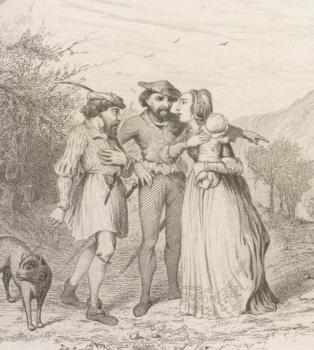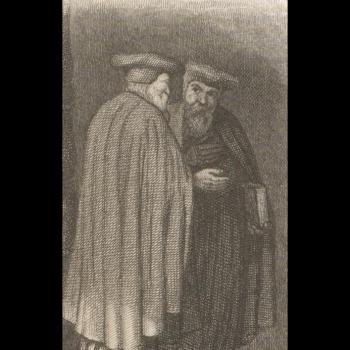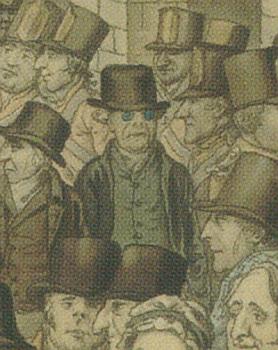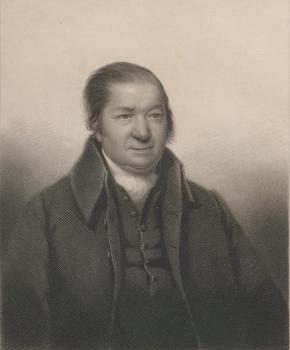15th November 2023
A list of chapter headings and photographs in Peter Girard's Guernsey: a miscellany of Guernsey history and its people, by Peter J Girard. Published by the Guernsey Press in 1986. The owners of the photographs are to be found in the acknowledgments, including those photographs belonging to the Priaulx Library Collection.
17th February 2023
A letter from Mary Naftel, nee Higman (b. Cornwall, 1756-1820), to Mary Harrison, 1799. From The Friends' Miscellany, Volume 11. Mary was the wife of clockmaker and Quaker Nicholas Naftel (1762-1852), and travelled extensively in the ministry, including to America.
3rd October 2017
The obituary of a learned and popular priest, who had spent 50 years in Guernsey. From The Guernsey Press, 16th December 1954. Anslem Bourde de la Rogerie was an erudite man who wrote learned articles on the history of the island. He gathered together invaluable information about Victor Hugo and the time he spent in Guernsey and published it in 1944 as Victor Hugo à Guernesey.
11th May 2017
By Joseph-Laurent Couppey of Cherbourg, extract from 'Notice sur l'histoire des iles anglaises de Jersey, Guernesey et Aurigny, dans ses rapports avec l'histoire de la Normandie et spécialement du département de la Manche,' published in the Revue anglo-française, Poitiers, 1833, pp. 305-7. [From the French.]
25th August 2016
'Report from the missions: a letter from Monsieur de Putron, to the Editor. Quebec, January 1, 1817.' From the Magasin Méthodiste, 1818, p. 91, addressed to Jean de Queteville, Methodist pioneer and founder and editor of the magazine. Guernsey began very early to export French-speaking missionaries all over the world; poor Jean de Putron, however, felt let down by his Guernsey accent and inferior French, as spoken in Guernsey.
8th June 2016

A translation of an inquest conducted over several months in 1593 by the Colloque, or Assembly, of Bailiwick Churches. The Puritan ministers and elders had here to deal with a dreadful scandal. This piece had a genuine villain: Pierre Le Roy, known as du Bouillon, a church minister who had escaped the massacres of 1572. Formerly minister of the parish of Baron, in Calvados, he was now a refugee, in charge of the parishes of St Pierre-du-Bois and Torteval. The inquiry is full of the detail of the life of ordinary Guernsey people, who gave evidence to the assembly. Michelle Palot, a maidservant to Madame du Bouillon, the minister's wife, was the subject of continued harassment by du Bouillon. Having a baby out of wedlock was highly frowned upon, the mother usually having to do public penance and the father, once ascertained, jailed for a couple of weeks, and forced to marry the mother or at least support the child; but when Michelle was questioned by the authorities as to who had fathered her baby, she gave them a most unexpected answer.
8th June 2016
1593. Pierre du Bouillon's story unravels as witnesses speak out and brave Michelle Palot refuses to waver. The illustrations are from 'Le Cantique de Geneviève de Brabant' and 'Le vieux Château des Ardennes,' in Chants et chansons populaires de la France, Paris: Garnier Frères, 1854, in the Library collection.
28th January 2016
By George Rabey, in The Guernsey Free Churchman, Vol. VI (3) March, p. 27. 'A good 126 years ago now ...' The detail is of Etienne Gibert (1736-1817) amongst the crowd in Matthias Finucane's Market-Place, Guernsey, 1809. He is here aged about 73. For a somewhat less quirky portrait of him see Nicolas De Garis, conscientious objector; there is a third portrait of him, exhibiting considerably more dignitas, in the Library collection.
3rd November 2015
Guernsey's first Methodist preacher Jean de Queteville writes about his son Jean in his Magasin Méthodiste of 1818, twenty-five years after the little boy's death. The portrait of de Queteville is from Henri de Jersey's Vie du Rév. Jean de Queteville, avec de nombreux extraits de sa correspondance, et un abrégé de la vie de Madame de Queteville, London: J Mason, and Guernsey: Mademoiselle de Queteville, St Jacques, 1847.
19th October 2015
A letter transcribed in Andros correspondence, a 19th-century notebook which belonged to Charles Andros. To Madame Andros, en la Court de sa Majesté de la Grand Bretaigne. Peter de Jersey was the minister of the Town Church from 1659 through the Restoration until the turmoil of 1662, when he was replaced by Huguenot refugee Pierre Jannon. Mme Andros was the wife of the prominent royalist Amias Andros. She was Elizabeth Stone; her brother Sir Robert Stone was cupbearer to the Queen of Bohemia and captain of a cavalry troop in Holland. In the early years of the war she left the island for St Malo, but on the way was captured by the parliamentary forces and returned to her enemies in Guernsey. In 1645 she managed to escape from the beseiged Castle Cornet to Jersey, leaving her husband behind; they did not see each other again for nine years.




